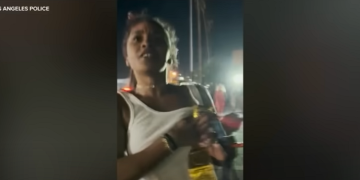
The mother of two of three children of R&B legend Marvin Gaye is expected to testify today in the trial of a federal copyright lawsuit alleging Robin Thicke and Pharrell Williams plagiarized key elements of Gaye’s song “Got to Give It Up” for their hit “Blurred Lines.”
Janis Gaye is expected to be the first witness to take the stand in the lawsuit filed by Marvin Gaye’s children.
Williams and Thicke are also expected to testify in the case, along with Thicke’s estranged wife, Paula Patton.
In opening statements Tuesday, an attorney for the two musicians said they were inspired by — but did not plagiarize — Gaye’s recordings while creating the megahit “Blurred Lines.” A lawyer for Gaye’s children, however, insisted the pop stars clearly copied from the Motown legend.
An eight-member federal civil jury will determine if Thicke and Williams lifted key elements from Gaye’s 1977 hit “Got to Give It Up” for their summer 2013 song, and if so, how much money should be awarded in damages to Gaye’s survivors.
“Nobody owns a style, a genre or a groove,” Thicke attorney Howard E. King told the jury in his opening statement. “To be inspired by Marvin Gaye is an honorable thing.”
But Gaye family lawyer Richard S. Busch told the panel that the two songs are “very similar and, at some points, identical,” and that Thicke and Williams admitted in interviews that “Got to Give It Up” was the template for “Blurred Lines.”
In their opening statements, both attorneys used exhibits that enlivened the first day of trial.
King played the colorful “Blurred Lines” video, first telling panelists that there were two versions produced.
“The version you won’t see lacks clothing,” the attorney said.
As the video played, Thicke bobbed his head and smiled as he sat in court.
Earlier, Busch played a “mash-up” of a segment of Gaye’s “Got to Give It Up” vocals placed over a portion of the “Blurred Lines” melody, played by an electronic keyboard — an attempt to demonstrate how similar the two elements were.
Thicke, facing away from the jury, mouthed the words, “No way,” and shook his head.
At issue is whether Thicke and Williams lifted the Gaye song’s compositional elements, including the melody line found on the sheet music, rather than the overall sound and atmosphere of the record. The case could potentially be worth millions of dollars to the Gaye clan in damages.
Busch said “Blurred Lines” made more than $40 million from all revenue streams, including tour proceeds.
King, however, told the jury that although the song was profitable, its earnings were “not anywhere near $42 million.”
Writing credits on “Blurred Lines” are shared by Thicke, Williams and rapper T.I., while the production is credited to Williams.
The Gaye children’s 2013 lawsuit also accuses Thicke of lifting from their father’s “After the Dance” for the title track of his 2011 album “Love After War.”
In interviews with GQ and Billboard magazines, Thicke said “Got to Give It Up” was one of his favorite songs and he wanted to “make something like that, something with that groove.”
“Blurred Lines” sold about 15 million copies worldwide, according to Billboard.
Marvin Gay was shot to death by his father in Los Angeles on April 1, 1984.





















